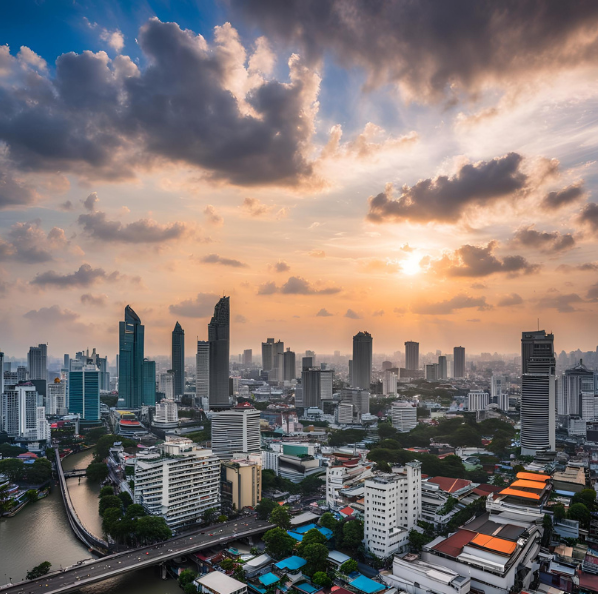Thailand—particularly Bangkok—is often hailed as a “condominium paradise”, with its skyline lined with sleek, modern residential towers.
New high-rises featuring pools, gyms, and lounges are launched one after another, all within a regulatory environment that allows foreigners to purchase with relative ease.
By contrast, Japan is still widely perceived as “the earthquake nation,” leading some to question its safety and viability as a long-term asset.
And yet, a growing number of affluent Thai investors are intentionally choosing Japan for real estate.
Why would they shift capital to Japan, when they already have access to high-end property at home?
The reason lies in Japan’s quiet strength—an enduring value not always visible on the surface.
■ [Thailand] Outstanding Affordability—But Liquidity Challenges Remain
In Bangkok, foreign nationals are legally permitted to purchase condominiums under defined conditions.
With a budgetロof JPY 50 million, one can acquire a newly built, fully serviced 2–3 bedroom residence exceeding 100 sqm in the highly sought-after Sukhumvit area—within walking distance from the BTS skytrain.
- Pricing: Less than half the cost of a comparable unit in Tokyo
- Ownership: Available under Thailand’s 51% foreign ownership regulation
- Rental Demand: Relatively robust
However, key challenges arise when it comes to resale and market saturation.
- A surge in similarly designed developments has made product differentiation increasingly difficult
- Property values often experience early depreciation, with resale prices falling short of initial expectations
- Even within prime locations, local end-user demand remains limited, largely concentrated among foreign buyers
In short, while the entry point is attractive, the long-term investment profile is far more uncertain—particularly in the context of capital preservation and exit liquidity.

■ Japan: Undeniably a “Land of Earthquakes” — and That’s Why It’s Strong
Japan experiences a high frequency of earthquakes. However, this reality also means that Japan possesses some of the most advanced seismic technologies and building standards in the world.
In other words, Japan should not be recognized simply as a country “where disasters occur,” but rather as a nation “most rigorously prepared for disasters”. This exceptional resilience has earned Japan a high global reputation.
- Buildings constructed under the post-1981 seismic code are remarkably robust
- Seismic isolation and vibration control systems have become standard features in large-scale condominium developments.
- Periodic large-scale maintenance and proactive disaster-prevention frameworks managed by resident associations
- Extensive disaster education initiatives implemented by both municipalities and condominium communities
In other words, Japan should not be recognized simply as a country “where disasters occur,” but rather as a nation “most rigorously prepared for disasters”. This exceptional resilience has earned Japan a high global reputation.
■ Why Affluent Thai Buyers Are Turning to Japan
Affluent individuals from Thailand are increasingly drawn to Japanese real estate, primarily due to Japan’s sense of security and refined aesthetic sensibility.
- Japanese lifestyles emphasize cleanliness and order, resulting in minimal property deterioration.
- Strictly functioning management associations ensure that common areas are consistently well-maintained and visually pleasing.
- Minimal neighbor disputes contribute to a stress-free and tranquil living environment.
- Excellent surrounding infrastructure, including hospitals, schools, parks, and public transport, enhances everyday convenience and comfort.
Moreover, Japan’s luxury condominiums embody what can be described as “livable art.” These properties offer an extraordinary experiential value, characterized by elegant spatial design, acoustic serenity, and breathtaking views.
■ True Peace of Mind in Real Estate Resides in the “Unseen”
No matter how impressive the lobby or how breathtaking the view, a property cannot provide genuine peace of mind if the building quality, legal transparency, or resident culture is uncertain.
Real estate in Japan has the following advantages:
- A robust legal framework ensures clear and secure ownership rights
- Minimal contract disputes and rare occurrences of fraud make transactions highly transparent
- Seamless coordination among real estate agents, judicial scriveners, and property managers ensures post-purchase confidence
- Income and property tax systems are well-defined, with no special taxation that disadvantages foreign buyers
Together, these elements form what is now widely recognized as a “stress-free real estate experience” — a hallmark of Japanese property ownership.

■ Summary – A Value Shift from Flashiness to Preserving Wealth
Thai real estate is attractive. However, Japanese real estate offers a completely different appeal: it is a “quietly secure asset that protects wealth.”
Rather than chasing flashiness or high yields, affluent buyers are seeking “spaces where they can entrust their lives with peace of mind.” In that sense, Japan is now truly a country with a compelling reason to buy.
- Resistant to depreciation
- Meticulously maintained
- A source of pride to own
- Easy to rent or sell when necessary
Rather than chasing flashiness or high yields, affluent buyers are seeking “spaces where they can entrust their lives with peace of mind.” In that sense, Japan is now truly a country with a compelling reason to buy.




